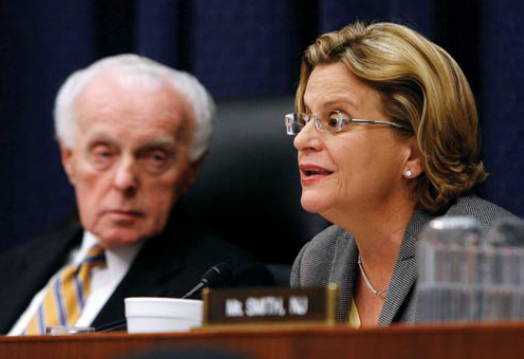In Michigan, a high school basketball coach was charged in May with supplying cocaine and ecstasy to a 17-year-old who died after ingesting the drugs. In Illinois, two men await trial for their role in selling heroin to a 26-year-old who later died of an overdose. For months, police in Ohio have searched for the whereabouts of an 11-year-old missing after her mother overdosed on drugs. In one small Texas town, police have made more than 200 drug arrests of high school-age students, and since January two teenagers have died of heroin overdoses.
Everyday, tragedies like these are playing out with horrible consequences for families and communities all across our country. More Americans die annually as a result of drug overdoses than the number of those killed on 9/11. Just as worrisome are the links between violent crime and the drug trade. Thousands more Americans – mostly the young – are murdered and maimed in gangland-style disputes over deadly narcotics, disputes that spill into the streets of our cities and towns with bloody results.

Without an effective counter-narcotics strategy in the Western Hemisphere, the number of U.S. deaths from overdose and drug-related killing will again rise…
The ease with which international drug traffickers have access to our country to peddle these deadly narcotics also has significant and adverse consequences for our neighbors in the Western Hemisphere. An estimated 90 percent of the cocaine and 50 percent of the heroin consumed here is produced in Colombia – a country now entering the fourth decade of a murderous conflict pitting the central government against drug traffickers and their allies.
By 1998 an area in Colombia equal in size to the state of California was effectively off-limits to the central government as left-wing insurgents allied with drug cartels created a rival government in the jungle. By then, Congressional Republicans and then-President Bill Clinton were sufficiently alarmed about sky-rocketing drug use in America and the specter of a heavily-armed narco-state developing in this hemisphere that together we forged a new counter-narcotics policy.
What emerged was something called Plan Colombia. This ambitious multi-year program sought to help Colombia beef up its police and military forces, begin an aerial spraying program to eradicate thousands of acres of coca plants, ease U.S. trade restrictions to promote alternative sources of income for the people of Colombia, and fund other economic and social development programs to revive an economy in free-fall.
What has been achieved by Colombians with assistance from the U.S. is truly remarkable. Since 2001, cocaine production in Colombia is down by 22 percent; seizures of cocaine bound for the U.S. are up by two-thirds; Colombian opium poppy cultivation is down by 68 percent, from 6,540 hectares in 2000 to 2,100 in 2004; kidnappings in Colombia are down by 76 percent; terrorist attacks are down by 61 percent; and the homicide rate – an astonishing 14,000 last year – is down 40 percent. Economic growth averaged 5 percent over the period and hit a high of 6.8 percent in 2006. The poverty rate is down from 60 percent to 45 percent.
Despite these successes, Plan Colombia is encountering growing resistance from the new Democratic majority in Congress. Critics on the left oppose U.S. funding for security assistance to beef up capabilities of the Colombian police and military. With more than $5 billion in U.S. assistance since 1999, the central government has steadily and effectively extended its reach into the countryside and driven the paramilitary units and the left-wing insurgents out of their former strongholds. Many of those that remain have retreated into the jungles and continue to terrorize the population and provide security for drug cartels, albeit on a smaller scale.
As the central government has regained control of the country, something very important has begun to happen. Thousands of Colombians are feeling safe enough to publicly speak out about the atrocities they endured in years past and to seek justice against the perpetrators. Dozens of powerful Colombians, including members of Congress, high-ranking officials, and others have been implicated in testimony with having ties to paramilitary groups. President Uribe and the military command have repeatedly said that they will not tolerate collaboration between military officials and members of paramilitary organizations. Unfortunately, U.S. critics of Plan Colombia have eagerly seized on these scandals as proof that U.S. policy has failed. But exactly the opposite is true. Rather than push away the Colombians during this difficult period, America should embrace our ally and help it through the process of rebuilding.
As Democrats in Congress move forward in the months ahead to make changes to Plan Colombia, they would do well to keep in mind that reducing our commitment to Colombia has implications on our home front. Denying the Colombian navy the assistance to purchase maritime patrol aircraft will undermine its ability to interdict drug shipments bound for America, such as the seizure in April of 17 tons of cocaine off its Pacific Ocean coastline, the largest in history. Denying the Colombian National Police access to helicopters and other U.S. equipment will only benefit the violent left-wing insurgents and their paymasters in the drug cartels and undermine the successful efforts to eradicate opium poppies in the high altitudes of this mountainous country. Holding hostage the pending Free Trade Agreement with Colombia because of what critics claim is a failure by the Colombian government to protect trade unionists will undermine Colombia’s economy and begin the downward spiral of America’s closest ally in South America.
We will feel the effects of these disastrous policies on our streets. Without an effective counter-narcotics strategy in the Western Hemisphere, the number of U.S. deaths from overdose and drug-related killings will again rise, and the floodgate of narcotics will open even wider with a deluge of heroin and cocaine aimed squarely at our kids. Let us hope that Congress will put behind it the ideological disputes of the past and act to protect us here at home by helping the people of Colombia protect themselves and their country.
Ileana Ros-Lehtinen represents the 18th District of Florida in the U.S. House of Representatives. She serves as Ranking Republican on the House Foreign Affairs Committee.




